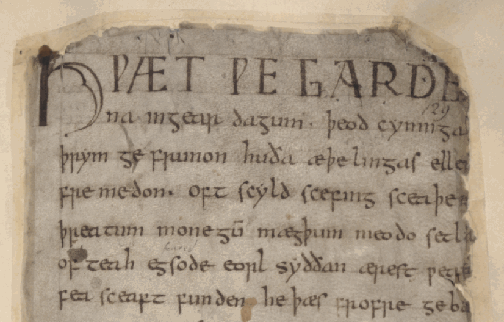
In Beowulf, we see a number of elements throughout the poem. First, we see a pagan warrior society. In this society the relationship between a king and his thanes is key. It is a symbiotic relationship in which the thanes defend the king and his land and fight his wars. In return, the king provides for his men. He offers them such items as mailcoats, swords, helmets, gold rings, mead, beer, shelter and companionship. This society also places great value on kinship. If one's kin is killed, it is the remaining relative's duty to make the killer pay for the death, either with his own life or the payment of wergild (the "man price"). Finally, we see the recurrence of the pagan ideas of fate and courage. Men believe that fate controls their lives. Beowulf constantly tests fate and believes that through courage he can live on in the memory of those who will live after him.
In the section of the poem dealing with Grendel's Mother's attack, we see the warriors settling down to sleep in Heorot after the huge celebration of Beowulf's victory over Grendel. They seem unaware of the fact that Grendel has kin who may come to avenge his death. Grendel's mother appears on the scene, snatches a man away and hurries back to the mere. When it is discovered a man is dead, sorrow is renewed. There is no more joy at Heorot, now that the she-monster has sought "payment" for the death of her son. Yet since she and her son are monsters, the thanes feel little sympathy.
In this scene we also see the pointlessness of the blood feuds, especially in the line, "This was not a good bargain, that on both sides they had to pay with the lives of friends." (Norton, page 44.) For twelve long years Hrothgar's men were murdered. Beowulf put a stop to the madness when he killed Grendel. But no one has thought about Grendel's kin. When Grendel's mother seeks revenge, it is a different story. If it weren't for the fact that there are only two monsters in the mere, this blood feud could have gone on for ages.
Hrothgar summons Beowulf and tells him that the dead man is Aeschere, his dearest advisor. He begs Beowulf for help once more, and Beowulf agrees saying, "It is better for a man to avenge his friend than much mourn." (Norton, page 45.) It is here that we see Hrothgar contrasted with Beowulf. Hrothgar is described as "the hoary warrior"; he seems old, tired, and out of control. His thanes may be good at boasting, but they are unable to protect his kingdom. Beowulf, on the other hand, is young, strong, and courageous. He believes that "Fate often saves an undoomed man when his courage is good." (Norton, page 34.)
We see a similar contrast of age and fighting ability later in the poem when Beowulf is an old man and goes to slay the dragon. In that scene, Beowulf's age is contrasted with Wiglaf's youth. The big difference between these two scenes of the poem is that throughout his life, Beowulf does not fear going into battle for his people, but Hrothgar avoids it. Beowulf fights the dragon even if it means his own death.
On a final note, both pagan and Christian elements are present in this section of the poem. Grendel and his mother are once again referred to as descendants of Cain, the biblical "kin killer." It says, "From him (Cain) sprang many a devil (monsters such as Grendel and his mother) sent by fate." (Norton, page 43.) While we see references to Cain and the devil (both Christian elements) in this quotation, we are told that they are sent by fate, a pagan element. Further Christian elements appear in the discussion of how Beowulf relies on his "great strength, the large gift God had given him, and relied on the Almighty for favor, comfort and help." (Norton, page 43.) All of these aspects add up to the contrast between good and evil that is present throughout the poem. Beowulf represents good. God gives him strength; he is the superhero and avenger. Grendel, his mother, and the dragon on the other hand represent evil. Beowulf becomes the superhero because he is the one who never shies away from doing what he ought to do. He therefore achieves his destiny.
This website was created by:
To see sources used to gather information for this website, click here.